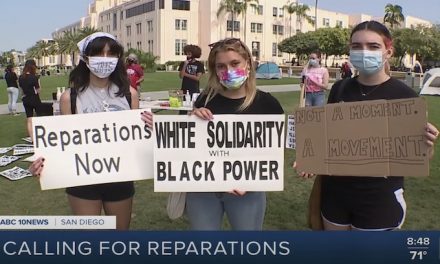A $62 million state fund to support Black Oregonians and their businesses received nearly 7,000 applications in the first four days after its launch Monday.
The Oregon Cares Fund for Black Relief and Resiliency will provide grants of $500 to $3,000 for Black individuals and families, and $2,000 to $100,000 for Black-owned businesses and Black-led nonprofits.
By Thursday, 6,672 individuals and families, 201 businesses and 43 nonprofits from throughout Oregon had submitted online applications. The fund is being guided by the Council of Trust, a newly established group of 11 Black leaders from across the state, and is being administered by two nonprofits, the Contingent and the Black United Fund.
“There’s been such a history of disinvesting or ignoring Black communities,” says Sharon Gary-Smith, former executive director of the MRG Foundation and member of the council. “This is a major effort for a specific time, during a pandemic, to provide investment in people to be whole in this moment. That for me personally, as a native-born, Black Oregonian, is a major step.”
The Oregon Legislature’s Emergency Board voted in July to allocate federal CARES Act dollars to seed the fund, a controversial decision that the legislative counsel warned may be unconstitutional.
In distributing the money, organizers hope to avoid the pitfalls that plagued a different relief program targeted at providing short-term aid to Oregonians with unpaid jobless claims.
That program, also established by the emergency board, allocated $35 million to pay $500 to people still waiting on unemployment benefits or suffering economically from the pandemic. The money went out on a first-come, first-serve basis and was fully depleted in less than three days last week as thousands of Oregonians lined up for hours.
The Oregon Cares Fund will choose its recipients following a review and verification process, with the Council of Trust making final decisions.
It’s ultimately a subjective call, but organizers say they have a process to ensure the funds are distributed equitably. The fund’s managers will score applicants on specific metrics based on their need and the financial losses they’ve suffered due to the coronavirus pandemic.
Last week’s $500 payments had no similar review process — those at the front of the line got the money, so long as they attested that they qualified and provided valid identification.
The $500 payouts went to about 70,000 Oregonians. The total number of Cares Fund recipients will depend on the size of individual grants.
Cares Fund organizers say that they will be doing outreach in communities throughout the state and hiring staff to ensure that individuals and businesses, including those without reliable access to the internet, are aware of the fund and have help navigating the application process.
Roughly 35% of the money in the fund will be distributed to individuals and families, while 53% will go to businesses and 12% will go to nonprofits, according to the Council of Trust.
“In our process, one of the things we are rooted in is equity,” said Rep. Akasha Lawrence Spence, D-Portland, a member of the Council of Trust. “We are going to be looking at people’s needs. … This is really about reaching Black Oregonians in every corner of our state and this process is as equitable as possible and really need-based.”
The Council of Trust will review requests for funding over three application periods and will make funding decisions within two to three weeks after an application period closes. Funding decisions will be made beginning in September and all funds must be distributed before the end of the year. To receive a grant, applicants must show they have experienced financial hardships due to the pandemic.
“We, as a community-based group who advocated for this fund, came up with the $62 million number because it’s what we believe will do the work to shore up our small businesses, our community, individuals and families, as well as our nonprofits,” Spence said. “We do not believe there will be people who apply and demonstrate strong need that will not be able to receive these funds.”
The legality of the fund is in some question. A July 13 opinion by the Legislative Counsel’s Office said setting aside funds for one race could be considered unconstitutional without strong data and evidence showing “past discrimination in the economic sphere.”
Sen. Lynn Findley, R-Vale, asked at the time why other groups who had been hard-hit by the COVID-19 pandemic, including Latino and Native American populations, were being left out.
But proponents of the fund pointed to a legal opinion from firm Schwabe, Williamson & Wyatt that contended that Black Oregonians are both suffering disproportionate economic harms from COVID-19 and receiving disproportionate aid from existing relief efforts. A study conducted by the National Community Reinvestment Coalition in July found that Black business owners had a harder time securing coronavirus financial relief than white business owners.
Other metrics show that Black Americans have been disportionately affected by the coronavirus pandemic as compared to white Americans. Black Americans are contracting COVID-19 at 2.6 times the rate and dying at 2.1 times the rate of white Americans, according to the Centers for Disease Control and Prevention.
The unemployment rate dropped to 10.2% nationally in July, but still remained at 14.6% for Black Americans, the highest unemployment rate among the racial and ethnic groups tracked by the U.S. Department of Labor.
Stephen Green, an entrepreneur and member of the Council of Trust, said that the fund marked an important first step in closing the gap for Black Oregonians who have been hard-hit by the coronavirus crisis and have struggled to access relief. But Green said that more needs to be done to help the Black community and that there will be a continued push for programs that invest in Black Oregonians.
“The Black community was far behind other communities before COVID-19,” Green said. “There’s still a lot that needs to be done.”
— Jamie Goldberg
___
(c)2020 The Oregonian (Portland, Ore.)
Visit The Oregonian (Portland, Ore.) at www.oregonian.com
Distributed by Tribune Content Agency, LLC.
—-
This content is published through a licensing agreement with Acquire Media using its NewsEdge technology.



















Recent Comments